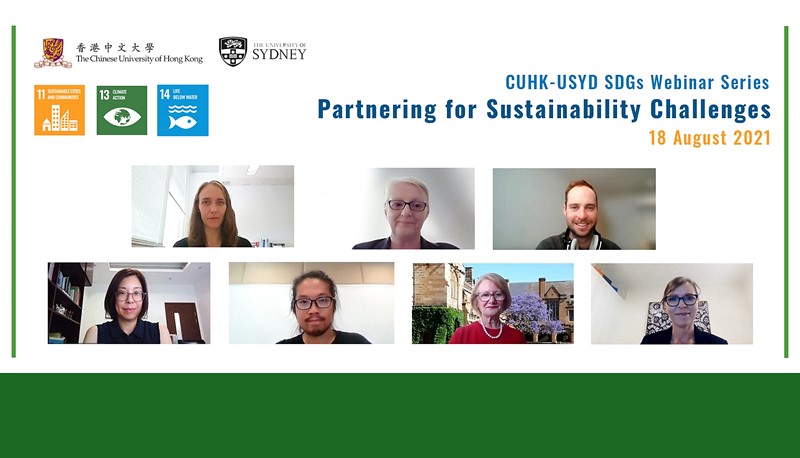
Demystify the secret of successful international collaboration

Joint webinar with USYD reveals how successful international partnerships are forged to promote research excellence.
CUHK and The University of Sydney (USYD) have identified each other as a strategic partner and the two universities have been working closely on different fronts of teaching and research. With a view to promoting global strategic partnership and inspiring new avenues of collaboration, the Office of Academic Links and USYD jointly organised the ‘Demystify the Secret of Successful International Collaboration’ public webinar in July to showcase collaborations in advancing research on diabetes, information engineering, and integrative medicine and share experiences and tips in building and sustaining global partnerships.
Speakers from CUHK included Prof. Ronald Ma of the Department of Medicine and Therapeutics, Prof. Alexander Lau of the Hong Kong Institute of Integrative Medicine, and Prof. He Chen of the Department of Information Engineering. They were joined by USYD scholars including Prof. Anthony Keech and Prof. Alicia Jenkins of the NHMRC Clinical Trials Centre, Dr. Josiah Poon of the School of Computer Science, and Prof. Wanli Ouyang of the School of Electrical and Information Engineering.
The speakers widely acknowledged that common goals and aligned research interests are key to successful collaboration. They also pointed to the greater synergies and expanded research scope made possible by capitalising on complementary strengths and resources. Dr. Poon said, ‘The Analytic and Clinical Cooperative Laboratory for Integrative Medicine brings clinicians from CUHK and data scientists from USYD to work together for better healthcare, proving that one plus one is better than two.’
‘My work with USYD on high-performance wireless systems draws on CUHK’s expertise in system building and USYD’s strength in theories,’ added Prof. Chen. ‘Furthermore, the tools and resources made available by USYD help accelerate our progress.’
Prof. Ma highlighted the importance of open and regular communication in a partnership. ‘Building successful collaborations require much support, commitment, and communication. Frequent contact is vital. We should be open to each other about the challenges and difficulties that we might have.’
Prof. Ouyang explained why international collaboration is especially important to the early careers. ‘When you don’t have enough resources and grants because you are new, seek collaboration so you can find more interesting research topics and leverage the profound expertise of your collaborators. When you lack experience in research, seek collaboration and advice from senior researchers who will be able to provide lots of help.’
A panel discussion was chaired by Prof. Mai-har Sham, Pro-Vice-Chancellor (Research) of CUHK towards the end, where she discussed the added value of international partnership and how difficulties in working together could be overcome.
‘International collaboration helps expand your existing research to cover new areas, angles, perspectives, and applications that you will otherwise not think of or be able to access. International collaborations do elevate research achievements,’ she said.

Webinar on sustainability kicks off the CUHK-USyd SDGs webinar series.
The webinar attracted 70 participants from 19 universities and organisations. It was the prelude to a series of joint webinars on how early-career researchers can help address the United Nations’ Sustainable Development Goals (SDGs). The first such webinar on Sustainability Challenges– Climate, Oceans, Cities and Communities was held on 18 August, featuring joint projects on urban climate and health, and marine ecosystem. Participants were given the opportunity to mingle with the speakers and other attendees to exchange ideas and contacts.
Watch the videos to revisit the webinars